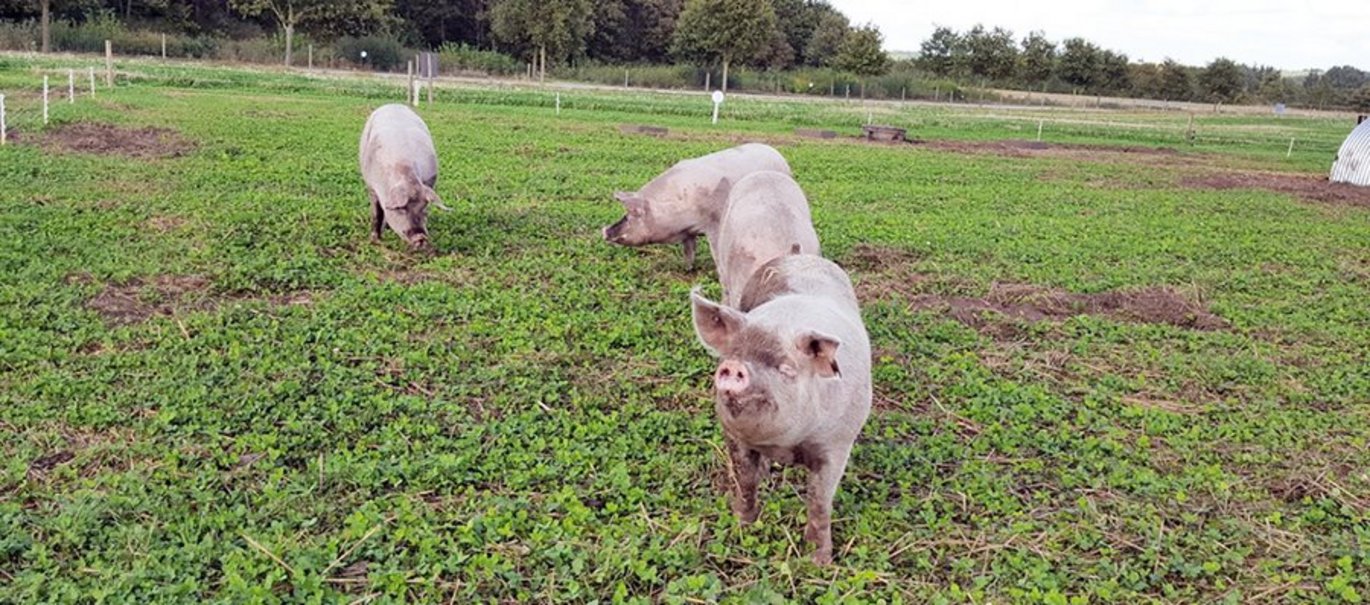Lower prolificacy and more robust piglets in Topigs Norsvin compared to Danbred
A controlled experimental study indicates that maternal traits of Topig Norsvin compared to Danbred sows may be more suited for outdoor organic production conditions. Offspring were more robust and meat percentage higher at slaughter.

In the Organic RDD2 project VIPiglets we identified amongst other high litter size and low birth weight to be important risk factors for the high neonatal piglet mortality (29 % of total born piglets) seen in Danish outdoor organic production. Therefore, the project partners (Aarhus University, SEGES Organic Innovation and Udviklingscenter for Husdyr på Friland/UHF and 5 organic farmers) initiated studies to identify alternative genetics to the highly prolific Danbred sows currently used by most conventional and organic producers in DK.
In a well-controlled experimental study, we compared maternal traits, offspring characteristics and slaughter data between Topigs Norsvin’s TN70 line and Danbred’s LY line. The study comprised 22 Danbred and 25 Topigs Norsvin (TN70 line) sows through first and second parity.
Maternal traits of TN70 were more suited for outdoor production condition
The TN70 sows turned out to be a good alternative to the Danbred LY sows under organic outdoor conditions. They had significantly more functional teats and gave birth to significantly less piglets; and the piglets had a higher birth weight (BW) (250 g higher in second parity). Thus, they were better able to take care of their entire litter, which meant no need for nurse sows. The higher birth weight resulted in less piglets with BW below 700 g, less piglets affected by growth retardation (IUGR), and piglets with an average higher body temperature 24 h after birth. Thus, the presence of major risk factors for mortality were reduced and in addition, the need for euthanasia of small unviable piglets were minor. Despite the lower prolificacy, TN70 sows weaned the same number of piglets as Danbred (avg. 11.8 piglets per litter) with an average of 1.2 kg higher weaning weight at 49 days.
Maternal protectiveness in the two genetic lines were also tested during routine handling of the litter day 1 and day 3. The proximity of the sow to the enclosed area, where handling took place, was observed every 30 sec for 10 min during processing along with a score for agitation. TN70 sows stayed in average closer to the enclosed area during handling and they were scored with a slightly higher agitation score. This indicates a more protective mothering style in the TN70 sows.
Thus, based on results from this smaller experimental study the TN70 animals produced a more robust offspring, and they were more suited to take care of their own offspring without human interactions; both aspects are important under outdoor extensive production condition where human intervention is more difficult to carry out.
Higher meat percentage in TN70 offspring at slaughter
However, one question is the maternal ability - just as important is the growth rate, feed conversion ratio and meat percentage at slaughter. We compared the growth rate and meat percentage at slaughter of approximately half of the piglets from each litter, while feed intake was not recorded. All females, both TN70 and Danbred, were inseminated with known semen from Danbred’s Duroc line in a balanced design. Thus, any differences between the lines were likely to be caused by differences in the maternal line. The results showed no difference in growth rate, while meat percentage were higher for TN70 than for Danbred offspring mainly at higher slaughter weights. The meat percentages of the two lines estimated at three different slaughter weights are shown in the table below:
| 75 kg slaughter weight (P=0.08) | 85 kg slaughter weight (P=0.02) | 95 kg slaughter weight (P=0.01) |
Danbred | 59,3 % (± 0,51) | 58,2 % (± 0,51) | 57,1 % (± 0,54) |
TN70 | 60,8 % (± 0,51) | 60,4 % (± 0,51) | 59,9 % (± 0,54) |
Due to the promising results, a Danish organic producer is now promoting organic TN70 replacement gilts for sale. In a newly started R&D project, Aarhus University will in collaboration with the private herd and UHF investigate the possibility to initiate a targeted selection for organic pig production based on genomic selection.
The project ’VIPiglets’ is a part of the Organic RDD 2- programme, which is coordinated by ICROFS (International Centre for Research in Organic Food Systems). It has received grants from ’Grønt Udviklings- og Demonstrationsprogram (GUDP)’ under the Ministry of Environment and Food of Denmark.
Visit the website of VIPiglets